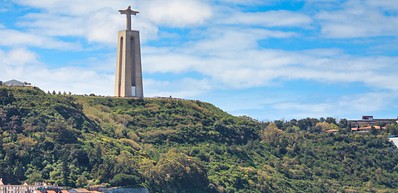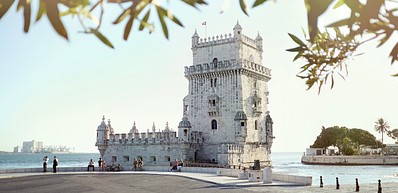
-
![Belem tower]() Provided by: Alex Paganelli/unsplash.com/photos
Provided by: Alex Paganelli/unsplash.com/photos -
![Belem tower]() Provided by: saiko3p/Shutterstock.com
Provided by: saiko3p/Shutterstock.com

Our travel guides are free to read and explore online. If you want to get your own copy, the full travel guide for this destination is available to you offline* to bring along anywhere or print for your trip.
*this will be downloaded as a PDF.Price
€4,95
Tower of Belém
The guide was updated:The Tower of Belém, officially the Tower of Saint Vincent, was built on the banks of the Tagus between 1515 and 1521 by King Manuel I of Portugal to guard the entrance to the port of Lisbon. Through the centuries it has served as a point of embarkation and disembarkation for Portuguese explorers, as well as a ceremonial gateway to Lisbon. In 1983 the tower was added to the UNESCO World Heritage List, together with the Jerónimos Monastery.
Useful Information
- Address: Torre de Belém, Avenida Brasília, Lisboa
- Opening hours: Tue–Sun 10am–5:30pm, Mon closed
- Phone: +351 21 362 0034

From USD 30
Lowest price guaranteedDigital Travel Guide Download
Our travel guides are free to read and explore online. If you want to get your own copy, the full travel guide for this destination is available to you offline* to bring along anywhere or print for your trip.
*this will be downloaded as a PDF.Price
€4,95

São Jorge Castle is one of the oldest structures in Lisbon. This was once a fortress (taken from the Moors in 1147), and now a must-see landmark with a fantastic view of the city. Peacocks and peahens a plenty around the grounds.
Humans have been living on the castle hill since at least the 8th century BC, while the first fortifications date from the 1st century BC. Truly a historic place!
Bookable
Read more

Best of Lisbon Guided Walking Tour
Experience Lisbon's rich culture and see landmarks like the Sé Cathedral and Commerce Square on an entertaining and informative guided walking tour.
Stroll the historic cobbled lanes and steep inclines of Lisbon's oldest neighbourhood, Alfama, then head to the elegant Chiado district with its art deco style.
Plus, learn about Fado–a music genre that can be traced to the 1820s in Lisbon–and stop by the city's best cafes and boutiques with your expert local guide.
Bookable
Read more

Jerónimos Monastery
In Belém (situated west of the city along the river) lies Lisbon’s, and possibly Portugal’s, most important historical monument. Here you can see an opulent church and cloistered garden built in the elegant Manuelian style at the beginning of the 16th century, when Portugal was a great seafaring power. Within walking distance of many other sights, the Gothic Jerónimos Monastery is a must-see on any itinerary.
Bookable
Read more

National Tile Museum
National Tile Museum is devoted to the quintessentially Portuguese tiles seen so frequently on buildings across the country. The collection is housed in a monastery, the varying architectural styles and decorations of which give a quick walkthrough the country's major movements. One of the highlights is an enormous tiled fresco which shows Lisbon as it was just before the big earthquake in 1755.
Bookable
Read more

LxFactory
LxFactory is an art centre with a strong industrial feel in the Alcântara district of Lisbon. Located on the grounds of one of the most significant textile factories dating back to mid-19th century, this complex of hipster delights boasts galleries, shops, restaurants and performance spaces. Slightly off the beaten track, but an absolute must-visit if you want to experience the more alternative and young side of Lisbon.
Bookable
Read more

Parque Das Nações
The area where Expo 98 was held has been successfully transformed into a centre for exhibitions, leisure and culture. The extensive amount of building since the Expo almost overshadows pearls such as Siza Vieira’s Portugal pavilion and Santiago Calatrava’s adjacent Oriente Station.
Green park spaces with public art link landmark contemporary buildings like the Camões Theatre and the Lisbon Oceanarium. Trendy waterfront restaurants, the glass-roofed Centro Vasco da Gama mall with shops and cinemas — everything you need for a fun weekend. Kid-friendly exhibits attract families to the Knowledge Pavilion, while the Telecabine Lisboa cable car offers sweeping views with a touch of adventure.
Bookable
Read more

Surfing
Take a break from city life and catch some Atlantic waves. One of the surfing companies located in the city is Get Stoked, which holds courses for both beginners and advanced surfers.
Bookable
Read more

Tram 28
Lisbon trams have transported people through the city since 1873. Even if today trams compete with the metro, they are still the perfect way to see the city and to get an overview. Tram number 28 is an old-fashioned vehicle that goes around town and you can hop on and off during your trip.
Bookable
Read more

Church of São Roque
Don't be fooled by the exterior — the Church of São Roque is one of the world’s most decadent and expensive churches, covered in gemstones, marble, mosaics, gold, silver and bronze. It took 130 Roman artists to create this masterpiece — one of the first Jesuit churches in the world. After being blessed by the pope, it was transported to Lisbon in 1574.
Within the same complex, you'll find the São Roque museum that offers a sizeable collection of Portuguese sacred art.
Read more

Lisbon Food & Wine Tour
Savour the best gourmet foods Portugal has to offer on a food and wine tour of Lisbon. You'll get to meet plenty of locals as you make stops at small businesses that produce and sell delicious cheeses, pastries and Port. Whet your appetite with petiscos — Portugal’s version of tapas; learn about Lisbon’s cafe culture, try the famous Portuguese codfish cake with a glass of refreshing vinho verde (green wine). A local guide will make sure you don't miss any essential delicacies and get just enough fun and interesting facts to appreciate the Portuguese cuisine to the max.
Bookable
Read more

Lisbon Zoo
Lisbon zoo is located right in the city centre. Home to over 360 different species, there is always something happening in the park. Fun for all the family.
Read more

Gulbenkian Foundation
The largest cultural institution in Portugal was founded in 1955 when Calouste Gulbenkian, the Armenian oil millionaire, donated his estate to the country that had welcomed him during World War II. This museum houses his extensive collections and is part of a larger complex that includes concert halls, a park, restaurants and a museum of modern art.
Read more

Lisbon Oceanarium
This is one of the biggest aquariums in Europe, with more than 100 different species. Some of the animals that are exposed here are barracudas, tuna, sharks, rays and one of the most popular attractions is a large sunfish — an adventure for all ages.
Read more

São Pedro de Alcântara Garden & Viewing Platform
To get a panoramic view of the city you can take the Gloria Elevator from Rua de São Pedro de Alcântara up to the garden, Miradouro de São Pedro de Alcântara. Here you can take a stroll between sculptures and busts of heroes and gods from Greco-Roman mythology.
Bookable
Read more

Pavilion of Knowledge
The Pavilion of Knowledge science centre is one of the extant gems of the 1998 World Expo. It was first built to focus on the mysteries of the oceans, but today it provides permanent exhibitions on chemistry, physics and other science subjects, mainly for the younger crowd.
Read more

Fronteira Palace
This Renaissance palace, still inhabited by the 12th Marquis of Fronteira, is shown to the public through guided tours. It was built as a hunting pavilion in 1670 for the first Marquis of Fronteira — one of the most powerful families in Portugal.
Read more

Sanctuary of Christ the King
With inspiration from the famous statue in Rio de Janeiro, this 28 metre high Jesus Christ statue was built in 1959. Take the elevator to the top and enjoy a stunning view of the city.
Read more

Monument to King José I at Praça do Comércio
The Monument to King José I can be found right in the middle of Praça do Comércio — Lisbon's grandest square. The square, still often referred to as Terreiro do Paço by the locals, is the perfect starting point for your exploration of the city. The square is hugged by historic buildings complete with countless columns. The statue of King José I faces the Tagus River — a gateway to the New World, now a busy transportation hub with a ferry terminal and connecting tram lines.
Bookable
Read more

Escape Room in the Heart of Lisbon
The Escape Hunt Experience Lisbon is a great activity for 2-5 friends looking for an exciting and unusual activity. Race against time to find clues and solve riddles. Choose from two unique ‘escape-the-room’ games. Tea, snacks and period costumes are all included.
Bookable
Read more

Miradouro da Senhora do Monte
Another great lookout is Miradouro da Senhora do Monte, located in a churchyard. It is recommended to visit this lookout early in the morning or late at night when this magic city lights up right beneath your feet.
Bookable
Read more

Cascais Village
For a relaxing day trip, take the train to the former fishing village of Cascais. Here you can stroll on the beautiful decorated streets, experience the lively fish auction held every afternoon next to the main beach, visit "Museu do Mar" to see the rich history of Cascais or take a refreshing walk along the coastal road to Boca do Inferno ("Mouth of Hell") where high waves crash into gigantic caves.
Bookable
Read more

Lisboa Story Centre
Visit the Lisboa Story Centre to get an engaging crash course into Lisbon's urban history. The whole story takes 60 minutes, so it is easy to make time for it.
Read more

Museum of the Orient
The much-lauded Museum of the Orient displays a rich collection of Asian artefacts, mainly from Macau but also from Japan, East Timor and India. The area dedicated to Chinese opera is just amazing with an incredible set of authentic Chinese masks and costumes.
Read more

Tower of Belém
The Tower of Belém, officially the Tower of Saint Vincent, was built on the banks of the Tagus between 1515 and 1521 by King Manuel I of Portugal to guard the entrance to the port of Lisbon. Through the centuries it has served as a point of embarkation and disembarkation for Portuguese explorers, as well as a ceremonial gateway to Lisbon. In 1983 the tower was added to the UNESCO World Heritage List, together with the Jerónimos Monastery.
Bookable
Read more

Monsanto Forest Park
Escape the hustle and bustle of the city — this forest area on and around the Monsanto Hill is home to the Monsanto Ecological Park, established to provide visitors with insight into the diverse natural and geographic environment of the area.
Don't miss the Panorâmico de Monsanto — the graffitied, abandoned Brutalist building of a former high-end restaurant that's now a popular spot for panoramic views over Lisbon.
Read more

Carmo Convent & Museum
Explore the crumbling ruins of this 14th century Gothic-style Catholic convent. Some of the building was destroyed in the 1755 earthquake, and it is the best-preserved pre-Earthquake building. Inside, you will find a small archeological museum showcasing the history of Old Lisbon starting in the time of Romans and Visigoths.
Read more

National Palace of Queluz
Only fifteen minutes from Lisbon, this National Palace was constructed as a summer palace for King Dom Pedro. It went on to be associated with numerous important figures in Portuguese history and is a site of heritage. The art collection reflects royal taste during the eighteenth and nineteenth century — from Baroque, through Rococo, to Neoclassicism.
Bookable
Read more

Miradouro das Portas do Sol
A must-see on every tourist's list, the scenic viewpoint of Portas do Sol offers panoramic views of traditional Alfama houses with rustic red roofs. The viewpoint is a good stop on your way to the São Jorge Castle — take the tram 28 up the hill and walk the rest of the way through the maze-like narrow streets.
Read more

National Museum of Ancient Art
Experience firsthand the splendour of Old Portugal at this national art museum. With an impressive collection of paintings, sculptures, ceramics, textiles, drawings and antique furniture, this museum offers a whistle-stop tour of the country's rich artistic history.
Read more

Sintra
Sintra is a charming town located in the lush hills of the Serra de Sintra amidst an evergreen pine forest known for its whimsical villas and the ruins of a 10th-century Moorish castle. The main attractions include the vibrancy-coloured yellow Palácio Nacional de Pena, the Neo-Gothic mansion of Quinta da Regaleira and the medieval Palácio Nacional de Sintra. The town's entire centre is a UNESCO World Heritage Site.
Some day tours to Sintra will also include a visit to Cabo da Roca — the westernmost point in Europe, as well as a stop in the Cascais bay area.
Bookable
Read more

Sunset Cruise on the Tagus River
Gain a new perspective on Lisbon by taking a Tagus River cruise at sunset, when the city's architecture and topology look especially magical in the golden rays of the sun. You will manage to see all of Lisbon's major waterfront attractions in one fell swoop: the Belém Tower, the Lisbon Cathedral, the St. George’s Castle, as well as pass under the magnificent 25 de Abril Bridge.
Bookable
Read more

Wine Tasting in the Setubal Region
The southern region of Setubal is famed for the production of sweet and fortified wines, mostly using the Muscat grape — Moscatel de Setubal. Tantalise your taste buds on a private guided day trip that will take you to multiple wineries. You will have an opportunity to sample various varietals paired with artisanal cheeses of this beautiful region. As a bonus, admire the surrounding topography and explore the green rolling hills.
Bookable
Read more


